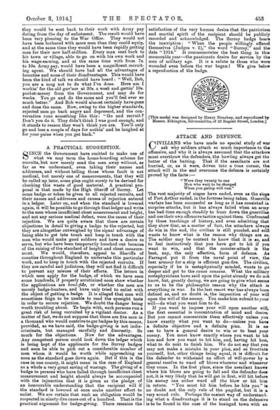A PRACTICAL SUGGESTION.
SINCE the Government have omitted to make use of what we may term the home-boarding scheme for recruits, but now merely send the men away without, as far as we understand, even taking their names and addresses, and without telling those whose fault is not medical, but merely one of measurements, that they will be called up later, some plan ought surely to be devised for checking this waste of good material. A practical pro- posal is that made by the High Sheriff of Surrey. Let some badge or token be given to all rejected recruits, and their names and addresses and causes of rejection entered in a ledger. Later on, and when the standard is lowered again, it will be possible to go through that ledger and write to the men whose insufficient chest measurement and height, and not any serious medical defect, were the cause of their rejection. We are quite aware that there are certain objections in detail to giving a badge to the rejected, but they are altogether outweighed by the signal advantage of being able to get into touch and keep in touch with the men who would make good soldiers and have a desire to serve, but who have been temporarily knocked out because of the raising of the standard of height and chest measure- ment. We would, therefore, appeal to Sheriffs of counties throughout England to undertake this particular work, and to keep in touch with the rejected recruits. If they are careful and judicious, they will not find it difficult to prevent any misuse of their efforts. The letters in which men apply for the badge, of which we have seen some hundreds, if properly scrutinized soon show whether the applications are bona fate, or whether the men are merely badge-hunters, and have only tried to enlist with the object of getting a badge. It is alleged that men will sometimes feign to be unable to read the eyesight tests in order to secure rejection. We doubt the danger being worth troubling about. To begin with, such persons run a great risk of being recruited by a vigilant doctor. As a matter of fact, we do not suppose that there are five men in a thousand who would contrive to get badges by this means, provided, as we have said, the badge-giving is not indis- criminate, but managed carefully and discreetly. So
much for the objections. Now for the advantages.
Any competent person could look down the ledger which is being kept of the applicants for the Surrey badges and soon be able to pick out a considerable number of men whom it would be worth while approaching as soon as the standard goes down again. But if this is the case in one county, it might mean in the case of England as a whole a very great saving of wastage. The giving of a badge to persons who have failed through insufficient chest measurement and height should always be accompanied with the injunction that it is given as the pledge of an honourable understanding that the recipient will if the standard is lowered at once make another effort to enlist. We are certain that such an obligation would be respected in ninety-five eases out of a hundred. That is the practical argument for badge-giving. There remains the satisfaction of the very human desire that the patriotism and martial spirit of the recipient should be publicly recorded and acknowledged. The Surrey badge bears the inscription : " When the people willingly offered themselves (Judges v. 2)," the word " Surrey," and the date " 1914." It commemorates the best thing in this memorable year—the passionate desire for service by the men of military age. It is a salute to those who were wounded even before the war began ! We give below a reproduction of the badge.
[This medal was designed by Henry Strachey, and reproduced by Messrs. Elkington, Silversmiths, of 22 Regent Street, London.]










































 Previous page
Previous page